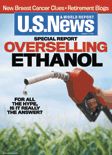 Well tickle my toes and call me Elmo! If it isn’t a big story — a cover story, no less — in a major American newsweekly that resists the siren song of ethanol.
Well tickle my toes and call me Elmo! If it isn’t a big story — a cover story, no less — in a major American newsweekly that resists the siren song of ethanol.
Kudos to Marianne Lavelle and Bret Schulte, whose U.S. News & World Report piece systematically deconstructs the ethanol craze, from twisted economics to limited supply to environmental degradation. And most pleasing to me, they didn’t do the standard pivot from “yeah, corn ethanol sucks” to “but cellulosic will save us!” In fact, they capture the problems with cellulosic in a few cutting paragraphs:
In the laboratory, so-called cellulosic ethanol can be wrung from fibrous materials like cornhusks and rice hulls, as well as fast-growing reedy crops that require little fertilizer or tending, like switch grass, and timber industry excess. This would ease reliance on edible grain and spread the economic benefits beyond corn communities. Another bonus: Biotech enzymes rather than heat energy would break down the cellulose to fuel, reducing greenhouse gases to a fraction of those produced by corn.
But it has never been tried commercially, and it’s unlikely that the fuel will go from zero to 20 billion gallons in 10 years. Just to get to 1 billion gallons of ethanol production, the corn industry took 13 years. The government estimates the capital cost of cellulosic is very likely five times that of corn. The expense surely would be driven down if production scales up, but a "chicken and egg problem" exists, says Harkin. "Investors are not investing in cellulosic plants because there’s no supply," he says. "And farmers are not planting switch grass or other energy crops because there’s no market." He has pledged to "jump-start" both demand and supply with research money and loan guarantees in a new farm bill.
But it will take more than money for new cellulosic technology to substantially weaken the grip of the nation’s oil addiction. Lee Lynd, Dartmouth College engineering professor and cellulosic pioneer, who founded Mascoma, a company that is building a pilot plant outside Rochester, N.Y., believes cellulosic will make "a much more limited contribution to energy supply" if behaviors don’t change as well as technologies. Ethanol would make its greatest dent if Americans drove less and highly efficient cars were deployed widely, he says.
Word to that.

